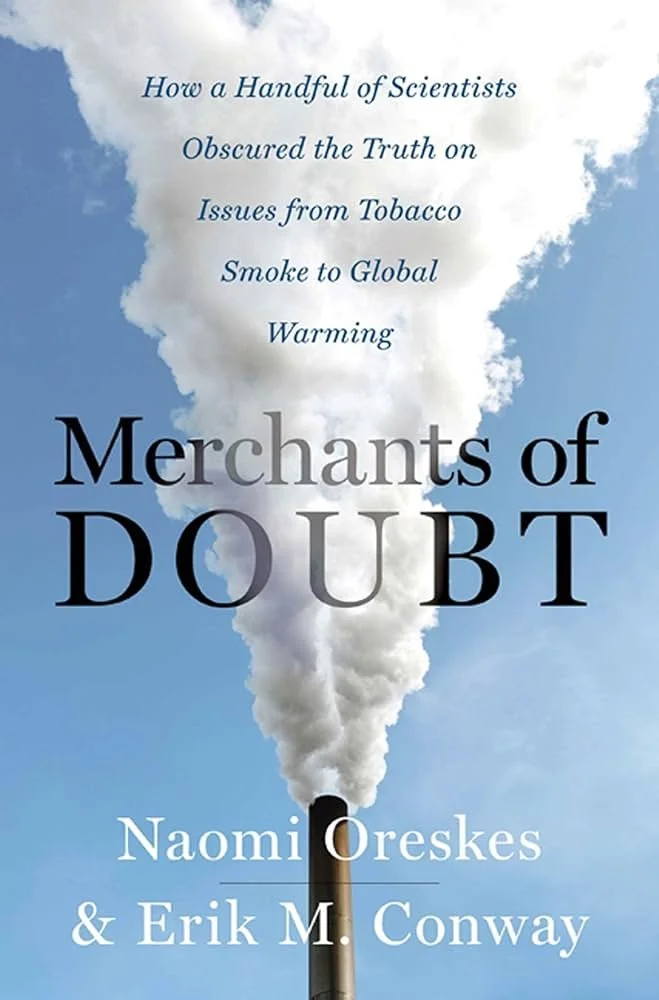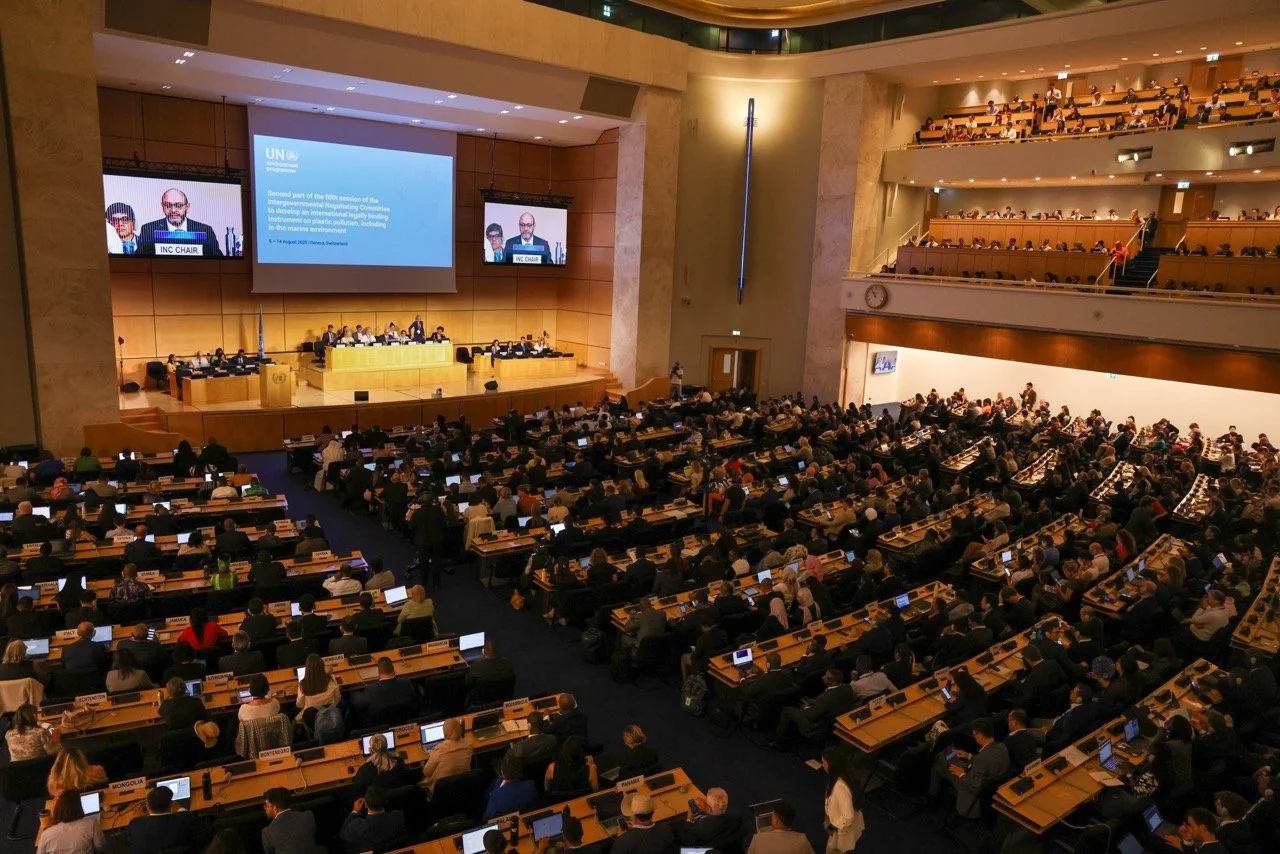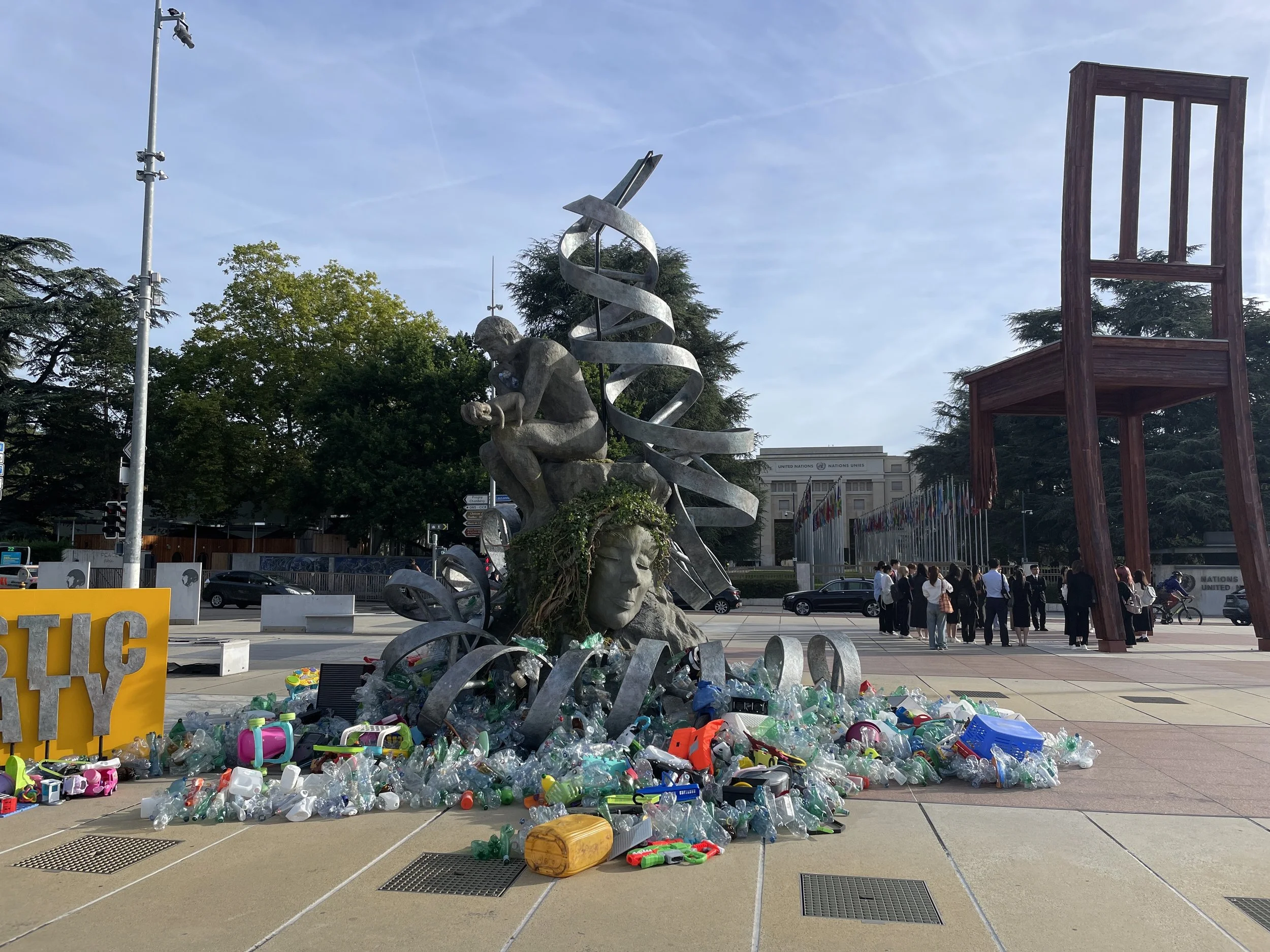Science and the UN Plastics Treaty: Honest Brokers and the Merchants of Doubt
By Dr. Marcus Eriksen
“We need honest brokers!” yelled the Russian delegate in front of 4,000 people from 175 countries gathered in Ottawa, Canada to negotiate a plastics treaty. This was the fourth of six week-long sessions organized by the United Nations Environment Assembly (UNEA). Months later, at the fifth gathering in Busan, South Korea, the Saudi Arabia delegate argued, “But there’s no plastic leaking from our factories – no evidence whatsoever.” Then, this summer, at the sixth and final negotiations at the UN in Geneva, the US cried, “This is not a plastics treaty, but a waste management treaty!”
Temporary alliances have formed to create power blocks, such as the Like-Minded Group – including Russia, Saudi Arabia, Iran, Iraq, Kuwait, Qatar, Bahrain, and other petrochemical states that want to kill the treaty, with the U.S. in quiet collusion. Yet they are outnumbered by a supermajority of the 75-nation High Ambition Coalition, that wants to eliminate certain chemical plasticizers, establish design standards, end the waste trade between nations, provide financial support island nations awash in beached trash, and place human health front and center. The stakes are high, with trillions of dollars in profits on the table.
Competing Visions for a Global Plastics Treaty
One organization, the Scientists’ Coalition for an Effective Plastics Treaty, was formed during the first negotiation session in Uruguay in 2022, when the scientists in the room recognized that many international delegates were often unprepared to discuss complex issues essential to creating an effective treaty to address plastic pollution on a global scale. They were also overwhelmed by corporate lobbying and strong-arm tactics from petrochemical states of the Like-Minded Group – nations, openly threatened by the science that brought us all here.
There is a geopolitical playbook of strategies that some countries use to delay, distract, deny, discredit, and derail international agreements that don’t align well with national interests – and science is often in their crosshairs.
The Scientists’ Coalition, now with more that 900 members, attended each negotiation session armed with policy briefs for each article of the treaty, delivering to delegates the most up-to-date evidence on subjects ranging from chemical toxicity to human health and environmental impacts. Scientists were placed in the rooms where treaty articles were being debated, listening for misinformation, and offering peer-reviewed scientific evidence in real time. It was soon evident that when science conflicts with national interests, nefarious actors work to cast doubt. When Russia called for “honest brokers”, they were talking about the scientists in the room.
In The Honest Broker: Making Sense of Science in Policy and Politics, Roger Pielke describes four kinds of scientists, and a fifth nefarious actor.
The Pure Scientists - This is a rare sight. Often a post-doc working on passion projects, radiating idealism, and not yet jaded by the realities of grant obligations or the publish-or-perish Achilles heel. They will migrate into one of the other three roles below.
The Science Arbiter- This is the ivory tower observer. Typically in academia, sits on advisory panels of all kinds, stays clear of politics, but can easily fall prey to a savvy lobbyist aiming to undermine their expertise.
The Honest Broker of Policy Alternatives- The defining characteristic of the Honest Broker is to step in when information is missing, to clarify, or sometimes expand the scope of options available for action. Their desire is to empower the policymaker to make a better decision.
The Issue Advocate- Pielke explains, “The defining characteristic of this role is a desire to reduce the scope of available choice, often advocating for a single preferred outcome among many possible outcomes.” They are powerful influences on public policy and public buy-in.
The fifth actor, and the most dangerous, is the Stealth Advocate or what Naomi Oreskes calls the Merchants of Doubt. They are not legitimate experts –they are non-scientists, or scientists in unrelated fields masquerading as experts. They feign authority. Their aim is to influence decision-making by creating confusion, even if it means mis-representing or inventing evidence. They elevate outdated research or reference non-peer reviewed reports, often from trade journals to attack contemporary scientific understanding, and when all else fails they attack scientists.
In Merchants of Doubt Oreskes describes tactics that have been used for decades to undermine public health and environmental policies – such as seeding doubt about the link between smoking and lung cancer, discrediting ozone depletion research to oppose the ban on CFCs, and promoting obscure arguments against climate change. The issues are different, but the tactics of these Merchants of Doubt are the same, and sometimes even the same people. Their methods include:
Discrediting science and exaggerating uncertainty
Promoting doubt and delay under the guise of “we need more research”
Creating false balance between established science and fringe ideas, often referencing their own non-peer-reviewed trade publications
Attacking scientists professionally and personally
Exploiting political and ideological differences
Using media bias, sensationalism, and PR to manipulate public perception
Creating front groups to lobby against science-based organizations
The goal isn’t to shine a light on what we know, but to cast scientific understanding into darkness, so that the international delegates debating the plastics treaty will think, “Scientists are still debating the issue, so we need more science. Some of the scientists here are more like activists and can’t be trusted. These new technologies will solve the problem, so focus less on changing the status quo.”
One industry front group, the Plastics Research Council, deployed Merchants of Doubt to the negotiations. Outside the Ottawa conference center,, Chris DeArmitt, polymer chemist and former ExxonMobile, perched to snag delegates. “Plastics, like polystyrene and PVC, are non-toxic,” he claimed, adding that delegates were being “hoodwinked by the propaganda machine.” Knowing his impact was overshadowed by the work of the Scientists’ Coalition, he went on the attack, “Don't be fooled by the so-called coalition.”
At times, the aggression turned physical. Bethanie Carney Almroth, an ecotoxicologist at Gothenburg University in Sweden and a core member of the Scientists’ Coalition, attended all six negotiation sessions. What she hoped would have been a professional process of evidence-based discussions with reasonable stakeholders, turned into something unexpected. She reported being, “verbally harassed, yelled at, and subjected to unfounded accusations,” such as, “fear-mongering and citing misinformation.” At another event, lobbyists from a U.S. chemical company “formed a ring” around her and bombarded her with claims that her research “misrepresented reality”, Almroth said. She and her colleagues even deployed laptop screen protectors when industry representatives were caught strolling back and forth behind them with their phone cameras. “This is an aggressive space,” Almroth warned her colleagues.
What does the Honest Broker do when science is attacked by Merchants of Doubt? In the presence of Merchants of Doubt, the Honest Broker often gets sidelined or sabotaged and fails to “clarify the scope of options available for action or empower policymakers to make better decisions.” When that Russian delegate yelled, “We need honest brokers!” what they were really saying was, “We are threatened by scientists whose evidence conflicts with our desired treaty outcomes . Therefore, they must be restricted from countering our information campaigns and stick to relating information when asked.” Russia, as a member of the Like-Minded Coalition of petrochemical producing countries, would prefer that the treaty ignore human health and chemicals of concern, and instead focus solely on waste management or simply just go away.
But, somewhere between the Honest Broker and the Issue Advocate lies the role of science at the UN Treaty negotiations: The Honest Advocate.
The Scientists’ Coalition strives for objectivity relying on teams of university-based experts to prepare briefs for delegates – such as when a handful of well-published toxicologists weighed in on “what we know” about ecological and human health impacts of highly-persistent chemical plasticizers. Yet in these highly politicized debates, it’s almost impossible for any perspective, regardless of the strength of evidence, not to be assigned to one side or another. As Merchants of Doubt deploy their playbook to deny and discredit science and attack scientists, the Honest Broker is forced into a position to simultaneously present objective science, while countering pseudoscience.
Somewhere between the Honest Broker and the Issue Advocate lies the role of science at the UN Plastic Treaty negotiations. This unique dilemma of science operating in politicized debates, whereby science is attacked in real time, is not discussed in Pielke’s The Honest Broker. Here, we offer the idea of the “Honest Advocate”, whereby the Honest Broker moves into a defensive position, presenting the best science available while confronting Merchants of Doubt by countering their attacks on science. While the Honest Broker always takes a position where the weight of evidence is the strongest, it becomes necessary to publicly identify the tactics of the Merchants of Doubt as they reduce “clarity” and “disempower” policymakers. It’s not issue advocacy, but an obligation that goes beyond being simply an Honest Broker. It is not about advocating a policy position, but rather advocating for integrity of science itself.
As the sixth negotiation session – referred to as INC 5.2 – came to an end, it was clear that there would be no treaty. It would be easy to label the effort as a failure, but was it a failure of science – or failure of the treaty process? Did the Merchants of Doubt prevail?
On August 15, 2025 the final plenary session convened, with many delegates angrily voicing their closing statements of frustration and disappointment. But what we heard over and over from delegates were statements in defense of science. “The science is clear,” said the delegate from Colombia. “We know enough to act,” said the delegate from Panama. Similar statements came from the European Union, African region, Pacific Small Island Developing States, and Latin American delegates. While the treaty may have failed, so did the Merchants of Doubt.
In the end, what was missing was a viable process. While many international delegates stood firmly in defense ofscience integrity, they also railed against the INC Chair’s requirement of consensus. “We will have no treaty until we all agree,” he repeated. By rejecting majority rule, the process allowed any single nation to hold the negotiations hostage – and the petrochemical states of the Like-Minded Group did exactly that.. One country’s “no” was enough to block the will of a supermajority of more than 120 nations advocating for a high ambition treaty.
Neil Tangri, Senior Fellow at the Center for Environmental Public Policy (CEPP) at UC Berkeley, put it clearly: “Two of the three legs required for an effective treaty are now in place: political will and a strong text. All that we lack is a good process. In particular, spoiler countries must not be allowed to hijack the proceedings against the will of the majority.” Armed with a strong draft text built on a foundation of good science, ambitious countries are now free to take the negotiations outside of UNEP with a coalition of the willing.




